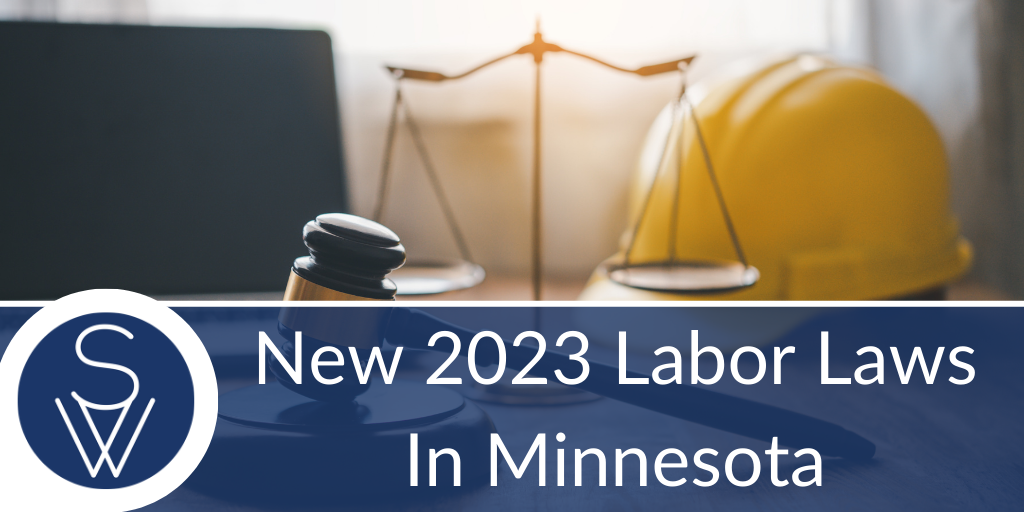
The 2023 changes to Minnesota employment laws are here and they are so sweeping that Minnesota’s commissioner of labor and industry, Nicole Blissenbach, lauded them for making Minnesota into “the best state for workers and their families.”
Are you ready?
Most of these changes will significantly affect multiple employer practices, including workplace accommodations, paid family and medical leave, sick days, drug testing, safe working conditions, and noncompete clauses. Yet, not all Twin Cities employers have fully embraced or prepared for them. To help you ensure that you’re ready, we’ve pulled together this overview of the legislative changes most likely to impact you:
- Paid Leave Changes
- Paid Family and Medical Leave
This new Minnesota bill, entitling employees to paid sick and safe leave, applies to employees applying to any employer with one or more employees. Beginning on January 1, 2026, eligible employees will accrue at least one hour of sick and safe time for every 30 hours worked, starting on their first day of employment. These leave hours will continue to accrue up to a maximum of 48 hours per year, while employers may choose to provide more. Under the provisions of this new law, unused sick and safe time will roll into the following year, up to a maximum of 80 hours. This “earned sick and safe time” is defined within the details of the law but includes the time needed to attend to an employee’s mental or physical illness or to care for a family member.
Minnesota Pregnancy and Parental Leave (MPPL)
Minnesota already required employers with 21 or more employees to provide unpaid pregnancy and parental leave, after a twelve-month eligibility period. However, starting on July 1, 2026, all employers with one or more employees will be required to provide up to twelve weeks of protected, paid MPPL, with a twenty-week cap for all leave types per year – and without the length of service eligibility requirement. The actual pay amount will be determined by a formula that is based on the employee’s wages. The law also protects employees from discrimination or retaliation arising from their leave status.
Drug Testing
Because the state’s new laws now allow Minnesotans to possess and use marijuana recreationally, employers will no longer be able to refuse employment to workers for using defined marijuana and other cannabis products that are now “lawful consumable products.” The new law also limits employers’ ability to drug test for cannabis, allowing testing only for safety or concerns of on-the-job use. Employers are still able to pursue disciplinary action when employee use of marijuana occurs on the job or renders the employees incapable of performing their duties appropriately.
Safe and Healthy Working Conditions
Pregnancy Accommodations
Going forward, employers with one or more employees must also provide reasonable accommodations to pregnant employees who request them on the advice of their healthcare provider. Employers who can establish that providing the accommodations would unduly harm them may be exempt. These accommodations include providing temporary transfers to less hazardous or strenuous roles, temporary leaves, and task or schedule modifications. Importantly, however, employees will no longer be required to provide proof of health care provider advice for longer or more frequent restroom, food, and water breaks, seating changes, and limits of twenty pounds on lifting requirements.
Lactation Accommodations
Employers are now required to allow lactating employees to take longer restroom, food, and water breaks. Language in previous laws that limited these accommodations to the first year after childbirth has been removed from the new legislation. In addition, employers must provide a space for lactating employees to express milk that is close to their work area. It must be a clean, private, and secure room or other location, with an electrical outlet that is not a bathroom or toilet stall.
Noncompete Clauses Banned
On May 24, 2023, Minnesota Gov. Tim Walz signed SF 3035, the law that now renders most noncompete agreements in the state unenforceable. With few exceptions, this change now allows talent (including employees and independent contractors) to move more freely to where working conditions and compensation are best, without being restricted by former employers.
CROWN Act
Minnesota also joined eighteen other states this year in the passage of the CROWN Act (for Creating a Respectful and Open World for Natural Hair). This new law clarifies the Minnesota Human Rights Act to protect natural “traits associated with race, including but not limited to hair texture and hairstyles such as braids, locs, and twists.”
Together, these laws do significantly alter the employment landscape for Minnesotans. While some of them may feel, at first, like larger burdens to some companies, we believe that they will only strengthen and empower employers in attracting and retaining the best talent from across the country. If you would like to discuss how you can promote these changes in your hiring process, please reach out. We would love to talk more with you about this!






